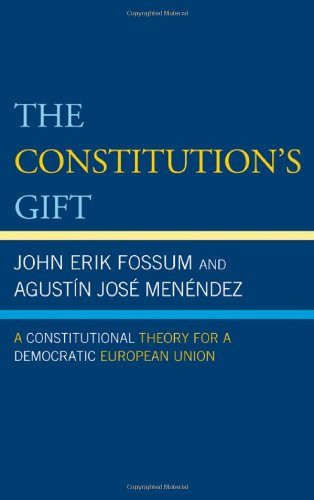The Constitution's Gift: A Constitutional Theory for a Democratic European Union
Agustin José MENENDEZ, John Erik FOSSUM
Availability: Out of stock - available in 15 open days
- Categories: Institutions, Treaties and Civil Service, Governance & Politics
- Publisher: ROWMAN & LITTLEFIELD PUBLISHERS
- ISBN: 9780742553118
- Publication Date: 01/12/2010
- Binding: Hardback
- Number of pages: 314
Summary
This authoritative study considers all aspects of the European Union's distinctive constitution since its inception. A unique political animal, the EU has given rise to important constitutional conundrums and paradoxes that John Erik Fossum and Agustín José Menéndez explore in detail. The authors consider the process of forging the EU's constitution and the set of fundamental norms that define the institutional structure, the decision-making procedures, and the foundations of the Union's democratic legitimacy. Their analysis illuminates the distinctive features of the EU's pluralist constitutional construct but also the interesting parallels to the Canadian constitutional experience and provides the tools to understand the Union's development, especially during the Laeken (2001–2005) and Lisbon (2007–2009) processes of constitutional reform.
The authors' original theory of constitutional synthesis captures the distinctive traits of the European Union as a polity. It explains why and how the European Communities were established as the first constitutional union of constitutional states wherein integration would be steered by law, not power politics or imperialism. Similarly, it presents the European Union as one of the few examples of a polity that has transcended the paradigm of the nation-state (and perhaps even that of the state). Locating the substance and process of Lisbon in its proper constitutional context, Fossum and Menéndez explain why this should be seen as a new beginning of the Union's constitutional season, not its end. Offering the first history of European constitutional law that is both theoretically informed and normatively grounded, their book will be essential reading for all readers interested in the process and theory of European integration.
Table of contents
* Introduction: The European Enigma
* Introducing the Constitutional Tool Kit
* A Theory of Constitutional Synthesis
* From Paris to Nice: The Constitutional Path of European Integration
* From Laeken to Lisbon: Moving Beyond Synthesis or Heightened Constitutional Ambiguity?
* Untangling the Knots by Means of the Theory of Constitutional Synthesis
* Canada's Constitutional Experience and Lessons for Europe
* Conclusion: The Future of a Constitutional Experiment
